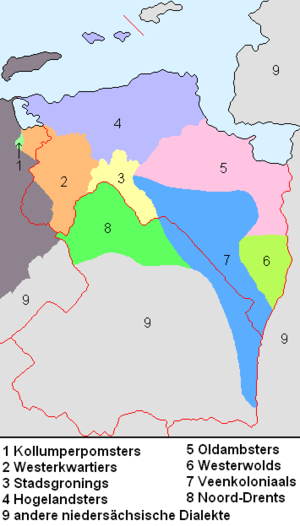Gronings
| Gronings, Gronings East Frisian ( Grunnegs ) | ||
|---|---|---|
|
Spoken in |
Groningen , North Drenthe , Veenkolonien (Oost-Drenthe), Kollumerland ( Fryslân ), Netherlands | |
| speaker | 310,000 | |
| Linguistic classification |
||
| Language codes | ||
| ISO 639 -1 |
- |
|
| ISO 639 -2 |
gem (other Germanic languages) |
|
| ISO 639-3 |
gos |
|
Gronings (self- names Grunnegs , Grönnegs or Grunnegers ) is a collective name for the Lower Saxon dialects of the province of Groningen in the Netherlands . The Gronings and the Low German dialects of East Frisia , the East Frisian Platt , form a striking subgroup in the Lower Saxony dialect continuum due to the common Frisian substrate . The Gronings is characterized by its special accent, its pronunciation variation to the Lower Saxon Platt and its special vocabulary.
Demarcation and history
The term Gronings can be strictly defined geographically. The transitions to the dialects in Drenthe are fluid. Around Zuidlaren , Peize and Roden the dialects are also often referred to as Gronings. The Groningen dialects are mostly named after the places and regions in which they are spoken, such as the Westerkwartiers , the Stadsgronings , the Kollumerpompsters , the Hogelandsters , the Oldambtsters , the Veenkoloniaals and the Westerwolds .
The Lower Saxon dialects in Groningen emerged, beginning in the 14th and 15th centuries, when the influence of the city of Groningen on the Frisian Ommelande became stronger and the Saxon city language quickly overlaid the old East Frisian language and almost completely replaced it. Today in Groningen, Frisian (West Frisian) is spoken only in a few villages in the Westerkwartier . In the meantime, the old city dialect of Groningen has almost disappeared in the city of Groningen itself.
Gronings East Frisian
In the Netherlands in particular, the dialects of the Groninger Platt and the East Frisian Platt are viewed as a common group and are referred to as "Frisian-Saxon" dialects. This goes back to the joint development of the Lower Saxon language on the Frisian substrate in the Ommelanden and East Frisia. The greatest commonality between Gronings and East Frisian is their vocabulary.
The main differences are due to the different influences of the German and Dutch standard languages and the different spelling. The spelling of the East Frisian Platt is based on German, just like the Groninger spelling is based on Dutch. A good example of this is the word for ice skate , which is pronounced almost the same in both dialects, but is spelled significantly differently (see below).
| East Frisian | Gronings | German | Dutch |
| Schöfel | Scheuvel | Ice skate | Schaats |
| lüttje | lutje | small | small |
| no | nij | New | nieuw |
| Muus | Moes | mouse | Muis |
| sük | zok | themselves | zich |
| Spread of Groning |

|
| The Groningen dialects in the provinces of Groningen, Friesland and Drenthe. |
Language example
- Onzevader (Our Father)
- Os Voader in Hemel,
- dat Joen Noam haailegd has been
- that Joen Keunenkriek may come,
- dat Joen wil doan wordt
- op Eerd net as in hemel.
- t Stoet doar like verlet van hebben
- geef os dat vandoag,
- en reken os nait tou wat like verkeerd doun,
- net zo as like vergeven elk dij os wat aandut.
- En breng os nait in verlaaiden,
- mor wil van verlaaider ons bogged down.
- The Joe within the Keunenkriek,
- de Kracht en de Heerlekhaid.
- Veur in aiweghaid.
- Amen
literature
- Henk Bloemhoff, Jurjen van der Kooi, Hermann Niebaum, Siemon Reker (ed.): Handboek Nedersaksische Taal- en Letterkunde. Van Gorcum, Assen 2008. ISBN 90-232-4329-3 (Dutch)
Web links
- "Up Platt up pad in Groningen" . Audio slideshow on various Groningen dialects (YouTube)